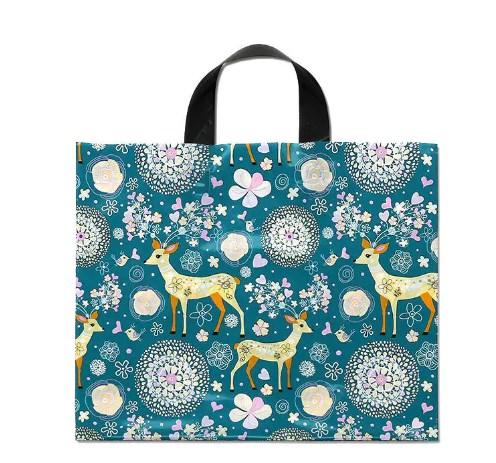In the modern era, where environmental consciousness is at an all-time high, the question of whether small plastic shopping bags with handles are suitable for repeated use has become a topic of significant interest. These bags, ubiquitous in retail environments, are designed to provide convenience and portability for consumers. However, their environmental footprint is a concern that cannot be overlooked. This article delves into the suitability of small plastic shopping bags with handles for multiple uses, examining their durability, environmental impact, and the role they play in promoting sustainability.
The first aspect to consider when assessing the reusability of small plastic shopping bags with handles is their material composition. Traditional plastic bags are made from polyethylene, a petroleum-based product that is not biodegradable and can take hundreds of years to decompose. However, advancements in material science have led to the development of more eco-friendly alternatives, such as biodegradable and compostable plastics. These materials are designed to break down more quickly in the environment, reducing the long-term impact of plastic waste.
Durability is another critical factor in the reusability of small plastic shopping bags with handles. A bag that tears easily or loses its shape after a single use is not a sustainable option. High-quality bags made from thicker plastic or reinforced materials can withstand multiple uses, making them a more environmentally friendly choice. Additionally, the inclusion of handles on these bags is a design feature that enhances their utility, as it allows for easier carrying and transport, potentially reducing the need for additional packaging materials.
The environmental impact of small plastic shopping bags with handles is a complex issue. On one hand, their production consumes resources and energy, contributing to greenhouse gas emissions. On the other hand, their lightweight nature means they require less material than other types of bags, such as paper or fabric. When these bags are reused, the environmental cost per use is significantly reduced, making them a more sustainable option over time.
Consumer behavior plays a significant role in the reusability of small plastic shopping bags with handles. Many consumers use these bags once and then discard them, contributing to the problem of plastic pollution. However, if consumers are educated about the benefits of reusing these bags and are provided with incentives to do so, the likelihood of them being reused increases. This could involve simple measures such as offering discounts for customers who bring their bags or creating awareness campaigns that highlight the environmental benefits of reusing small plastic shopping bags with handles.
The role of retailers in promoting the reusability of small plastic shopping bags with handles cannot be understated. By offering high-quality, durable bags and encouraging their customers to reuse them, retailers can contribute to a more sustainable consumption pattern. Additionally, retailers can take steps to ensure that their bags are made from eco-friendly materials, further reducing the environmental impact of their products.
In conclusion, the suitability of small plastic shopping bags with handles for repeated use is a multifaceted issue that involves material composition, durability, consumer behavior, and retailer practices. While there are challenges associated with the use of these bags, there are also significant opportunities for reducing their environmental impact through reusability. By choosing high-quality, eco-friendly bags and promoting a culture of reuse, both consumers and retailers can play a part in creating a more sustainable future for small plastic shopping bags with handle

